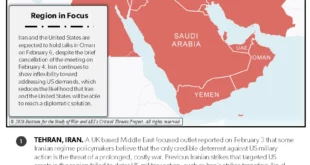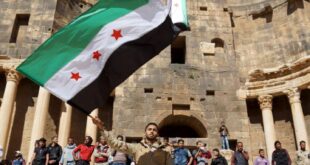OCCUPIED JERUSALEM — After nine days of bombing Lebanon, Israel has begun to doubt the effectiveness of an offensive that has failed to stop Hizbollah fire, eliminate its leaders or push fighters back from the border.
Ground troops are battling fighters as warplanes and navy gunboats pound Hizbollah positions and Lebanese infrastructure — and the United Nations has warned of impending “catastrophe” from the relentless assault.
The human cost has been enormous. In Lebanon, more than 325 people have been killed and another half a million displaced.
Fighters have blitzed northern Israel with nearly 1,000 rockets, and one million Israelis live under the constant threat of attack. The Jewish state has buried 29 people, and the authorities have declared a civilian state of emergency.
But so far there has been no news of the two Israeli soldiers who were snatched by Hizbollah fighters in a deadly attack on an army border patrol on July 12 — the incident which sparked the Israeli offensive.
“It is undeniable that Israel is in a bind. The army has again been overconfident and underestimated its abilities to break Hizbollah,” said Israeli military analyst Reuven Pedatzur.
The risk now is for the army to launch a large-scale ground operation in southern Lebanon in order to take up the slack from the aerial onslaught. That would make it vulnerable to Hizbollah fighters.
For the moment at least, the spectre of sliding back into the quagmire of Lebanon where hundreds of troops were killed in the disastrous 1982 invasion has put the brakes on a ground offensive against Hizbollah.
Yet Prime Minister Ehud Olmert has approved intensified ground operations, described by the military as “pinpointed”.
General Alon Friedman said the military was “operating to destroy Hizbollah infrastructure and underground bunkers in particular”, and that enough troops were concentrated on the northern border to launch a large-scale operation.
“There are basically plans for a large ground operation, but they are not being acted on at the moment,” Cabinet Secretary Israel Maimon told reporters.
Yet even the “pinpointed” operations have degenerated into heavy fighting. Two soldiers were killed on Wednesday and another three wounded Thursday.
“Hizbollah seems to be holding strong and its morale seems intact,” said Shaul Mishal, a Tel Aviv University specialist in Islamic groups. “It’s an illusion to think that with force alone we can destroy the weapons of a movement like Hizbollah, which has widespread support from Shiites in Lebanon who amount to around 40 per cent of the population,” he said.
Like other experts, he sees the only possible end to the crisis is the deployment of an “international force with a large mandate” in an agreement brokered between Israel and Lebanon.
The Israeli press, which has largely united behind the merits of the operation, was also left asking when the conflict would end as the Jewish state looked towards another weekend at war.
“This war is going to end with a sour taste in our mouths,” said the Yediot Aharonot newspaper. “Our three declared goals will not be achieved in full.” “In exchange for our kidnapped soldiers, ransom will be paid, the Shiite group will not be completely stripped of its arms, and the Lebanese army will do very little good even if it does deploy troops in southern Lebanon.” The liberal Haaretz newspaper saw no prospect of clear-cut victory from an aerial campaign alone, putting leaders in the dilemma of choosing diplomacy or launching a ground operation that could involve heavy losses.
“Despite the media euphoria and the patriotic spin, the aerial war led by chief of staff Dan Halutz is not heading for victory. In the best case, it is heading for a limited military achievement.
“The air force’s hammer blows are hitting Lebanon harder than they are hitting Hizbollah… Even in the best case scenario, Hizbollah will rise from the rubble,” the newspaper cautioned.
“One way or the other, the illusion of a magic solution is about to burst.” Â
 Eurasia Press & News
Eurasia Press & News



